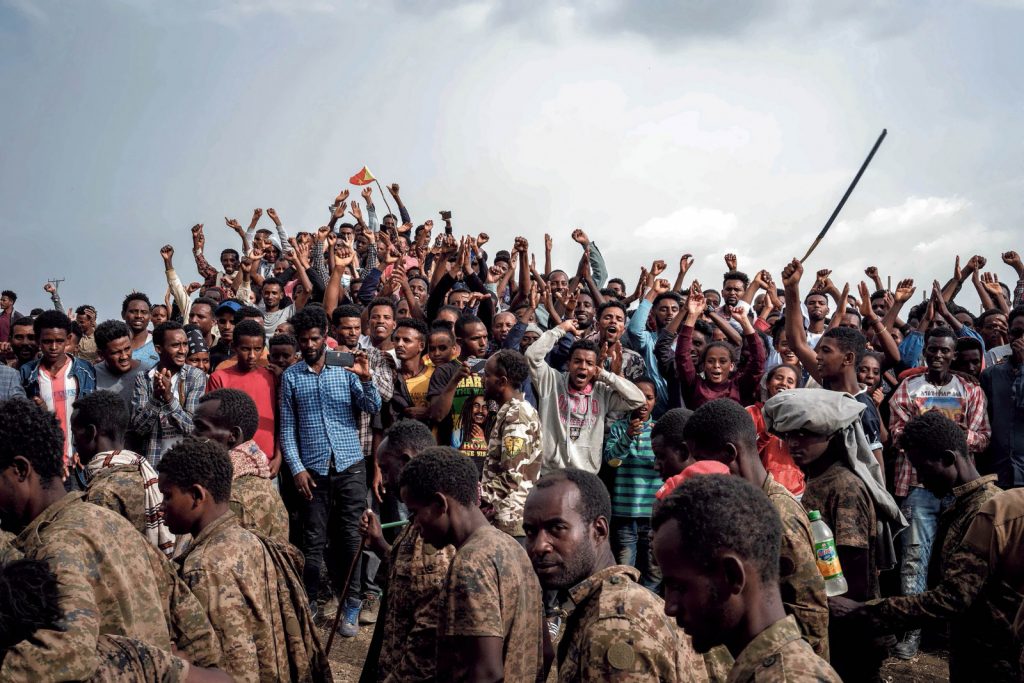On the dotted line: A peace agreement between Ethiopian government forces and Tigray nationalists is signed in Pretoria, ending two years of civil war in northern Ethiopia and hopefully putting an end to the humanitarian crisis the hostilities have caused. Photos: Yasuyoshi Chiba/AFP/Getty Images
Ethiopia and Tigray finally struck a peace deal to end their civil war after long drawn negotiations in Pretoria, head of the AU mediation team former Nigerian president Olusegun Obasanjo announced on Wednesday at a press briefing.
Ethiopia and Tigray agreed to a “permanent cessation of hostilities, restoration of law and order,” and perhaps most importantly as demanded by rights groups, “unhindered access to humanitarian supplies, protection of civilians, especially women, children and other vulnerable groups,” Obasanjo said.
In a joint statement, negotiators from the warring sides said they had agreed to “permanently silence the guns and end the two years of conflict in northern Ethiopia.”
In a statement posted on Twitter, Ethiopian Prime Minister Aiby Ahmed welcomed the agreement.
“The agreement signed today in South Africa is monumental in moving Ethiopia forward on the path of the reforms we embarked upon four and half years ago. Our commitment to peace remains steadfast. And our commitment to collaborating for the implementation of the agreement is equally strong,” Ahmed said.
The Horn of Africa returned in recent years to a hotbed of civilian strife, displacing millions of people according to aid agencies.
The detente has been hailed by the UN, which raised concerns about the war’s toll on civilians.
The agreement came a day after international humanitarian agencies at their own press briefing pressed for the protection of civilians, and accused the Ethiopian government of using food as “a weapon of war”.
According to aid and human rights agencies, the war between Ethiopian forces and Tigray nationalists has claimed the lives of hundreds of thousands civilians amid increasing concerns that humanitarian access remains limited.
The peace talks opened last week in Pretoria under the mediation of the African Union (AU) with Obasanjo leading the contingent.
In a press briefing on Tuesday, Refugees International raised concerns about the escalating number of civilians facing what it called “widespread displacement, atrocities, human rights violations and potential famine”, noting that more needed to be done “to stave off the worst for civilians trapped in the crosshairs of the conflict”.
“The conflict risks spiralling out of control following the resumption of fighting on August 24 after a five-month ‘ceasefire’,” Refugees International said.
The organisation’s senior advocate for east and southern Africa, Abdullahi Boru Halakhe, noted that because affected civilians rely on rain-fed agriculture, the humanitarian crisis had been escalated because of successive poor harvests.
“There is always a link between war and farming. The lifeline has always been humanitarian aid but more people will die, not because there is no humanitarian aid, but because aid is not being allowed to get to people,” Halakhe told reporters at the briefing.
Since being awarded the Nobel Peace Prize in 2019, Ahmed has come under scrutiny for his role in what World Health Organisation director general Tedros Adhanom Ghebreyesus last month called the “worst humanitarian crisis in the world”. Ghebreyesus is from Tigray.
 Strife: Captured Ethiopian soldiers walk towards a rehabilitation centre in Mekele, the capital of the country’s Tigray region
Strife: Captured Ethiopian soldiers walk towards a rehabilitation centre in Mekele, the capital of the country’s Tigray region
Food as a weapon
“Ethiopian governments have a tremendous rich history of using food as a weapon of war. And that is one element that is very troubling,” Halakhe said.
“And so, as the peace talks are going on right now, some parts of Ethiopian governments, Eritrean, and as well as other assortment of militias are engaged in conflict. That means Tigrayans on one hand are trying to find peace with Ethiopia, but they also have to deal with what is going on in the battlefront.”
There are concerns that the denial of access to food aid to fleeing civilians could worsen as more internally displaced people seek shelter in “caves, jungles and bushes”, said Solomon Mezgebu, president of the Tigray Human Rights Forum.
“The main feature of the war is the use of food and famine as a weapon and information blackouts,” said Mezgebu who also spoke at the virtual press briefing.
“If you have up to 4-million people walking in the jungle, who will count the people dying of hunger in the bushes?” he asked.
Ethiopian authorities have been accused of shutting down the internet, while journalists have fled into exile, fearing for their lives.
“The response by the international community has been lacking because this is not a conventional war because the media has no access to information,” Mezgebu said.
“We have got to emphasise that the situation is grim and dire. The cessation of hostilities should be now, not yesterday,” Halakhe added.
In a statement dated 25 October, US Secretary of State Antony Blinken urged delegations to the peace talks to “achieve lasting peace and prosperity for all Ethiopians”.
“As a first priority, it is essential to achieve an immediate cessation of hostilities. We also call on the delegations to agree on unhindered delivery of humanitarian assistance to all those in need, measures to protect civilians, and Eritrea’s withdrawal from northern Ethiopia,” Blinken said.
Refugees International said there was a huge backlog in getting food to people, and this needed immediate attention.
“Even if the conflict stops today, even if humanitarian aid comes in today, the backlog of trying to get things through makes for grim reading,” Halakhe said.
“Most children are out of school compared to areas such as Syria and Afghanistan. The impact is not just for now but the cognitive development of these children,” he added.
“The need to upscale humanitarian aid cannot be understated. Airlift of food assistance must start immediately to assist civilians because there is no other way to reach this population,” said Mezgebu.